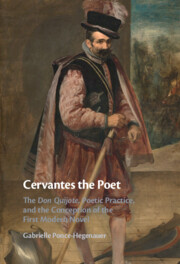 Cervantes the Poet
Cervantes the Poet Book contents
- Cervantes the Poet
- Cervantes the Poet
- Copyright page
- Dedication
- Contents
- Figures
- Acknowledgments
- Note on Abbreviations, Translations, and Terms
- Introduction The Unknown History of the Conception of the Don Quijote
- Chapter 1 Mimesis in the Court of Gentlewomen: The Pastoral Fabric of Everyday Life
- Chapter 2 Exalted Apostrophes: Cervantes in the Court of Isabel de Valois
- Chapter 3 Figura of the Poet: Pastoral Petrarchism as the Practice of Ingenious Gentlemen
- Chapter 4 The Form of Beauty: Lyric Lovers in the Mediterranean World
- Chapter 5 The Poet as Literary Character: Eclogues and Encomia in Madrid
- Chapter 6 The Literary Character as Poet: Lyric Subjectivity, Chronotopic Dynamism, and Plot in the Galatea
- Coda Alonso Quijano’s Lyric Subjectivity:
- Index
Coda - Alonso Quijano’s Lyric Subjectivity:
Interior Lexicons and Exterior Lexicons in the Conception of the Modern Novel
Published online by Cambridge University Press: 11 May 2023
- Cervantes the Poet
- Cervantes the Poet
- Copyright page
- Dedication
- Contents
- Figures
- Acknowledgments
- Note on Abbreviations, Translations, and Terms
- Introduction The Unknown History of the Conception of the Don Quijote
- Chapter 1 Mimesis in the Court of Gentlewomen: The Pastoral Fabric of Everyday Life
- Chapter 2 Exalted Apostrophes: Cervantes in the Court of Isabel de Valois
- Chapter 3 Figura of the Poet: Pastoral Petrarchism as the Practice of Ingenious Gentlemen
- Chapter 4 The Form of Beauty: Lyric Lovers in the Mediterranean World
- Chapter 5 The Poet as Literary Character: Eclogues and Encomia in Madrid
- Chapter 6 The Literary Character as Poet: Lyric Subjectivity, Chronotopic Dynamism, and Plot in the Galatea
- Coda Alonso Quijano’s Lyric Subjectivity:
- Index
Summary
The Coda engages prior theories of the novel which have unwittingly touched on lyric subjectivity as the motor of genesis in modern fiction qua the DQ. The Coda returns to Leo Spitzer’s seminal article “Linguistic Perspectivism in the DQ” (1948), in which the negotiation of lexicons also invokes Mikhail Bakhtin’s understanding of heteroglossia and polysemy in the Dialogic Imagination (1930s and 1940s, pub. 1975), and Gyorgy Lukács’ understanding of a rift between interiority and exteriority as transcendental homelessness in the Theory of the Novel (1915). While several of the insights found in their work hold true, their observations often unwittingly point towards the lyric, rather than epic, features of the novel as a modern literary genre. Their insights show that novelistic fiction is everywhere impossible without the lyric subjectivity at work in the practice of sixteenth-century Pastoral Petrarchism, in particular in the Galatea. In his conception of the modern novel, Cervantes preserves lyric subjectivity as narrative emplotment through the transformation of the figura of the poet into the modern madman (Alonso Quijano/don Quijote). This figura of the poet as modern madman is not particular to the DQ but inhabits the “center” of the modern subject.The DQ allows us to consider the foundational division of the modern subject: reason and madness.
Keywords
- Type
- Chapter
- Information
- Cervantes the PoetThe <i>Don Quijote</i>, Poetic Practice, and the Conception of the First Modern Novel, pp. 242 - 261Publisher: Cambridge University PressPrint publication year: 2023


